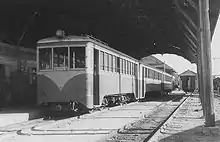Paknam Railway
The Paknam Railway was Thailand's first railway line, established in 1893. Stretching 21 km (13 mi), it was a narrow gauge line. The line was constructed by the Paknam Railway Company established by a British navigator Alfred John Loftus and the Danish naval commander Andreas du Plessis de Richelieu[1]:33. Construction commenced on 10 July 1891.[2] The company was granted a 20-year concession[3] to run the line. The opening of the railway on 11 April 1893 was attended by King Rama V who had in fact invested half of the 400,000 Baht funding required for construction of the line[1]:35.[4]
Route map | |||||||||||||||||||||||||||||||||||||||||||||||||||||||||||||||||||||||||||||||||||||||||||||||||||||||||||||||||||||||||||||||||||||||||||||||||||||||||||||||||||||||||||||||||||||||||||||
|---|---|---|---|---|---|---|---|---|---|---|---|---|---|---|---|---|---|---|---|---|---|---|---|---|---|---|---|---|---|---|---|---|---|---|---|---|---|---|---|---|---|---|---|---|---|---|---|---|---|---|---|---|---|---|---|---|---|---|---|---|---|---|---|---|---|---|---|---|---|---|---|---|---|---|---|---|---|---|---|---|---|---|---|---|---|---|---|---|---|---|---|---|---|---|---|---|---|---|---|---|---|---|---|---|---|---|---|---|---|---|---|---|---|---|---|---|---|---|---|---|---|---|---|---|---|---|---|---|---|---|---|---|---|---|---|---|---|---|---|---|---|---|---|---|---|---|---|---|---|---|---|---|---|---|---|---|---|---|---|---|---|---|---|---|---|---|---|---|---|---|---|---|---|---|---|---|---|---|---|---|---|---|---|---|---|---|---|---|---|
| |||||||||||||||||||||||||||||||||||||||||||||||||||||||||||||||||||||||||||||||||||||||||||||||||||||||||||||||||||||||||||||||||||||||||||||||||||||||||||||||||||||||||||||||||||||||||||||

Initially there were four steam locomotives constructed by Krauss & Co. of Munich,[5] and four trains ran in each direction daily. There were twelve stations in all, with trains taking one hour to travel over the line.[6] The line was initially a financial success. A motor-tramway service was introduced in 1908 and the line was electrified in 1926. After the end of the concession period, the line was purchased outright by the government in 1936 but there was little further investment in the line. By this time competition from buses running between Bangkok and Paknam was already impacting the railway's finances. During World War II the railway enjoyed a resurgence due to the impact of fuel shortages on the bus companies. Services were temporarily suspended in 1942 due to record flooding in Bangkok but services were restored soon after with twelve trips daily[1]:101–103.
After the end of World War II competition with buses and private cars again increased and by the 1950s the railway was operating at a loss. Several plans for modernisation were proposed but none were realised. In the end the Paknam Railway was closed at the end of 1959 to allow for the construction of Rama IV Road[1]:147–148.
References
- Kakizaki, Ichiro (2014). Trams, Buses, and Rails: The History of Urban Transport in Bangkok, 1886-2010. Silkworm Press. ISBN 9786162150807.
- Talbot, Frederick A. (2012-01-01). Railway Wonders of the World. BoD – Books on Demand. ISBN 9783846005279.
- Wright, Arnold (1908). Twentieth century impressions of Siam: its history, people, commerce, industries, and resources, with which is incorporated an abridged edition of Twentieth century impressions of British Malaya. London: Lloyd's Greater Britain Pub. Co. p. 202.
- "Newspaper Article - OPENING OF THE PAKNAM RAILWAY". eresources.nlb.gov.sg. Retrieved 2016-08-31.
- Barrow, Richard. "Quest for the Paknam Steam Train". Thai Blogs. Retrieved 2016-08-31.
- "Paknam Railway – Samut Prakan สถานที่ท่องเที่ยวจังหวัดสมุทรปราการ". paknam.com. Retrieved 2016-09-02.